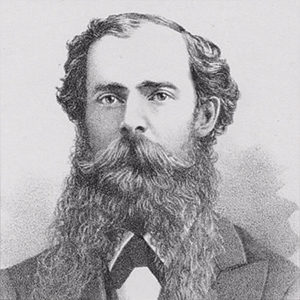 Henry Clay Work (October 1, 1832 – June 8, 1884)
Henry Clay Work (October 1, 1832 – June 8, 1884)
It is fitting that one of America’s greatest composers of the Civil War era was born into a heroic (although humble) family. The young boy was to follow in his father’s footsteps as a dedicated abolitionist, pouring his efforts into the cause of ending slavery forever. Born in Middletown, Connecticut, Henry Clay Work’s father Alanson moved the family to Quincy, Illinois when the child was just three years old. Here, their home became a way station on the Underground Railroad, housing and caring for thousands of escaped men and women of the slave trade fleeing to freedom in Canada.
Alanson’s activism was eventually uncovered by the authorities and he was imprisoned. Upon his release the family, now penniless, returned to Connecticut. Here, the young Henry began to teach himself to play instruments and to compose songs. He took a position with a printing firm in Chicago aged 23 and it was here that a breakthrough was achieved. His first published song, “We Are Coming, Sister Mary” was noticed by popular vocal group Christy’s Minstrels and soon became a regular feature in their performances.
His most prolific period of writing occurred during the war, and although he was brought much success by many of his songs, his post-war experience was mostly unhappy. His wife was diagnosed with a mental illness, and he saw only one of his four children reach adulthood. A failed investment and the loss of his office in the Chicago Fire led him back to poverty. Following a short period in New York City, the composer died in Hartford, CT in 1884.
Musical Style and Influences
Contents
His output was fundamental to the development of the American ‘verse-chorus’ structure, whereby a popular melody or ‘hook’ in the reprise would carry the song’s fame from state to state.
It is also noteworthy that he (almost always) composed the lyrics to his songs himself.
What was Henry Clay Work Known For?
The Music of Henry Clay Work
Work was considered by many to be the “War Poet” and captured (in his songs) a great range of emotions during the conflict. Whilst he often wrote songs in the ‘minstrel’ style, he did so with content that was designed to encourage African Americans rather than ridicule them. His most successful wartime song was his “Marching Through Georgia”.
Based upon the devastating campaign of General William Tecumseh Sherman, the song sold an unprecedented one million copies. “Grafted into the Army” was another wartime hit, but so too was his “Come Home, Father” of 1864: an early temperance song which was not related to the conflict, but instead sees a child plead with his father to cease drinking and return home.
Henry Clay Work Most Famous Works
Other songs which remain popular today include:
- Wake Nicodemus (1864)
- The Ship That Never Returned (1868)
- Kingdom Coming (1863)
- Crossing the Grand Sierras (1870)
However, his most successful post-war work is surely “My Grandfather’s Clock” (1876), the story of a clock which accompanies a man throughout his entire life. It is still performed by pianists, vocalists, brass bands and even pop groups.
